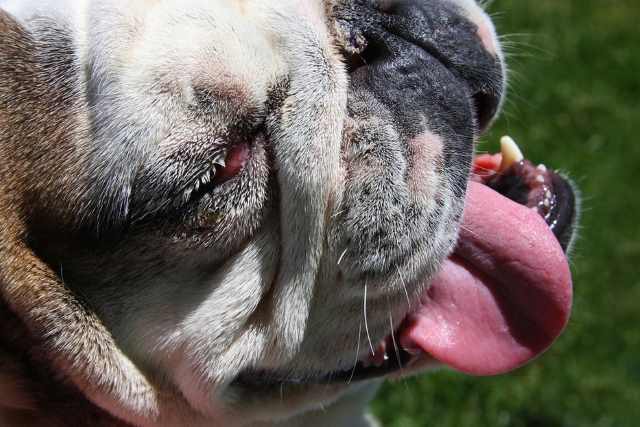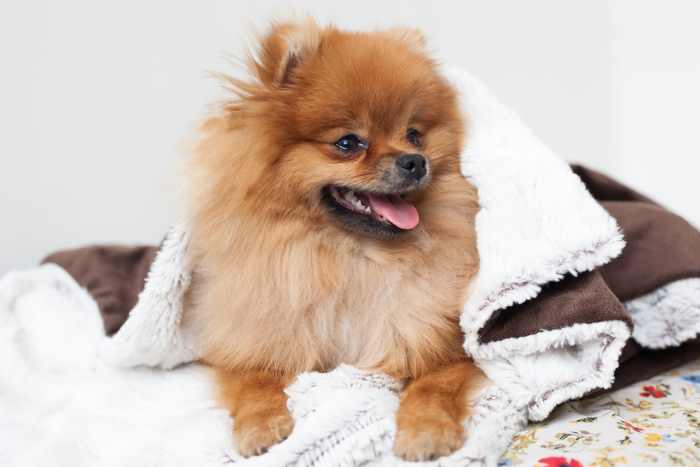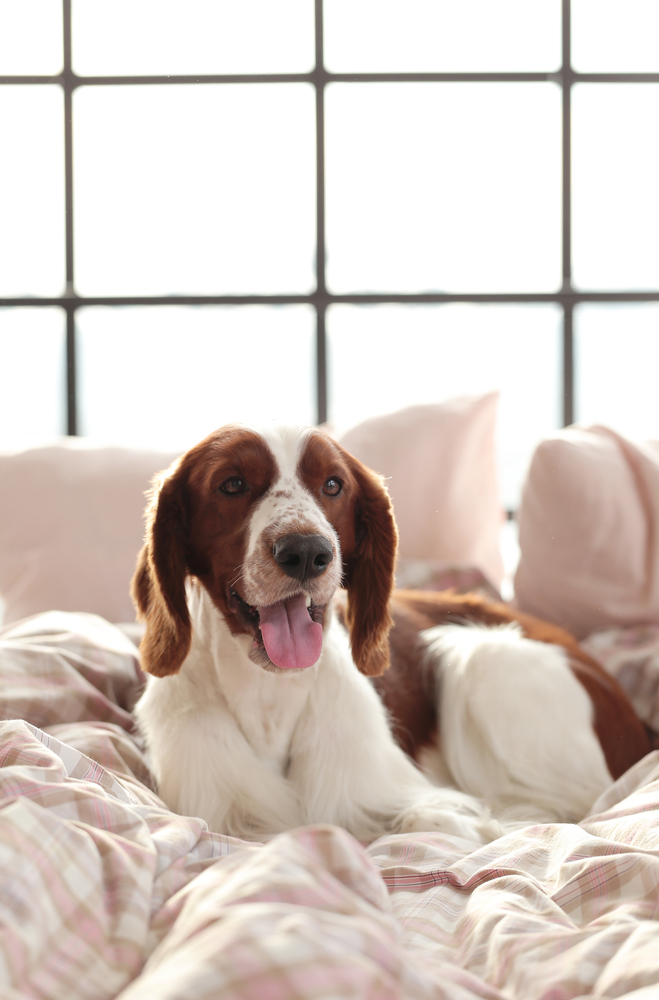Is Your Dog Panting at Night?
Dog Panting at Night Dr. John Brooks |Published 09-25-2019
Panting in dogs is a very healthy thing. You probably already know this if you spend any time with your dog. Panting is a sort of shallow, fast breathing that evaporates the water very speedily from your canine’s tongue, upper respiratory tract, and inside of his mouth.
 Is your dog panting at night rather than sleeping?
Is your dog panting at night rather than sleeping?In this process, the dog gets to control his body temperature as the water evaporates. Panting is a good thing for dogs because it prevents the dog from overheating. Unlike people, dogs do not have sweat glands that cool the body.
The only location on a dog’s body that has sweat glands is on their paw pads. While this helps somewhat, panting helps a dog to circulate air through their bodies, thus keeping them comfortable.
When a dog inhales and exhales for 30 to 40 times in a minute, it can be recognized as normal breathing. However, if your dog inhales and exhales for quite a lot, let’s say, 300 to 400 times per minute, it can never be normal breathing.
To be honest, normal panting doesn’t require your dog to use a lot of energy as there is elasticity of the airways and lungs.
Difference between Normal and Abnormal Dog Panting

Panting can be characterized into two types: Normal Panting and Abnormal Panting. When your dog’s body heats up, it leads to normal panting, which is considered a healthy and natural response.
But, on the other hand, abnormal panting is a sign your dog needs further investigation regarding his physical or emotional issues.
Look for these signs in your dog to differentiate the normal and abnormal panting:
- Abnormal panting seems disproportionate compared to normal panting.
- The sound of abnormal panting is louder or hoarser than what would be normal panting.
- Abnormal panting looks like the dog is exerting more effort than is warranted. He is putting more effort into breathing than during regular panting.
It can happen even when your little buddy doesn’t have to calm his body down and isn’t overly warm.
In case your canine all of a sudden starts panting at inappropriate times, let’s say at night, or it appears to be heavier than expected, you ought to be concerned, yet there’s no compelling reason to panic.
You should contact a veterinarian about your pooch’s symptoms and get him checked up. In fact, you can research the signs on the internet by visiting various animal blogs such as zooawesome.com.
Why is my dog panting at night?

Anxiety, nervousness, or an underlying condition are the most common reasons that make your dog pant at night.
When your dog is in pain, he pants frequently. You will notice it, especially when he is resting.
Joint pain is a big issue when it comes to older dogs because it gets worse at night when they are not active. At that point, you should consult a veterinarian.
Make sure that the place where the dog sleeps is not too hot and humid. You should at least place a fan close to your dog’s bed if the room is not air-conditioned.
The fan will circulate the air in the room so that your dog can breathe well. Make sure that the fan remains safe from him because he can get himself hurt if he gets near to the blades. I will discuss overheating in more detail in just a moment.
It’s better if you set up his bed inside your room because dogs really get anxious when their friends are not close to them. In any case, if his bed is not inside your room, you can place a radio near his sleeping bed and put on some soothing music so that it relaxes his mind and gets him to fall asleep.
However, today, we will demonstrate what makes a dog pant, especially at night. Let’s get started.
Most Common Causes for Dog Panting at Night
Heatstroke due to Overheating:
Overheating will cause a dog pant very fast and loudly. Elevated body temperature, glazed eyes, excessive thirst, dark or bright red gums or tongue, increased heartbeat, and pulse are the most significant signs of overheating.
Heatstroke can hit your dog if his body temperature reaches 109°F or even higher. When the temperatures get high, it leads to rapid damage to the body cells.
Seizures can also happen as the brain swells due to overheating. It also hampers the blood supply process to the GI tract. As a result, your little buddy can face ulcers. Lack of hydration prompts irretrievable kidney damage.
These cataclysmic things can happen within no time. Hence, overheating is an unsafe issue, and you should take all the precautions to cope with it at any time. You never know when he is going to face a heatstroke. That’s why you need to take every care to prevent it.
Genetic Predisposition
Brachycephalic breeds such as Boston Terriers, Pugs, and Shih Tzu dogs have breathing difficulties all the time. Because of the upper airway route difficulties endured by these pooches, they frequently don’t gasp effectively and are at very high risk for heatstroke.
If you are going to take your short-nosed dog on a ride by plane or even by car, it’s a must for you to take precautions. Unlike other pets, a brachycephalic will be uncomfortable in a hot vehicle.
Be familiar with your pug-nosed dog’s typical breathing pattern so that you can take immediate action whenever the breathing pattern changes.
On the off chance that you observe an intensification or some other change in his respiratory sounds, it’s critical to note when and where it occurred so you will be able to relay that information to your veterinarian.
Heart and Lung Diseases
Extreme dog panting can be a sign of heart disease such as dilated cardiomyopathy in your dog. Coughing, tiring quickly, decreased ability to exercise, and increased respiration can also represent heart disease in your dog.
When your dog’s heart is diseased, it can’t pump blood effectively around the body. As a result, the tissues start to have less engagement with oxygen, and it leads the dog to pant at night.
The heart becomes weak, and its strength to pump blood declines. Due to this, blood pressure can increase in the veins.
Fluid accumulation and congestion of the lungs can also lead to panting as the lungs become unable to transport oxygen to the bloodstream. As a result, oxygen deprivation happens, and your dog starts to pant excessively.
Pain
If your canine is feeling uncomfortable or is dealing with a known condition, it can lead him to frequent or heavy panting. You may notice abnormal panting long before you hear cries or whining due to pain.
However, it’s essential to consult a vet immediately if your dog is panting at night for no discernible reason. As they can’t express their physical or emotional conditions in words, we should take the responsibility to notice their behavioral changes to determine if they are in pain.
Phobia, Stress, Anxiety,
Your dog can be panting if he has phobias, or is anxious or stressed. This type of panting can be characterized as “behavioral panting,” and it can lead them to various signs of discomfort such as lip licking, repetitive yawning, crying or yawning, trembling, hiding, pacing, or even bowel control or loss of bladder.
If these signs are short-term in your dog, then it’s normal. Something may have caused acute distress, and your dog is dealing with the stress through panting.
However, take action if there is a prolonged fear response because it’s really destroying for his emotional and physical conditions, and it can hurt his quality of life.
Anemia
When there is a reduction of red blood cells, there is not sufficient hemoglobin to provide oxygen to the body’s tissues, it can lead your dog to experience oxygen starvation. As on account of heart and lung illness, one of the indications of oxygen deprivation is gasping.
There are some other signs of anemia, such as an elevated heart rate, lethargy, pale mucous membranes, weakness, exercise intolerance, mental confusion, heavy breathing, loss of appetite, and collapse. These things can cause panting in a dog at night.
Laryngeal Paralysis
This disease stops the vocal folds inside the throat from working appropriately. It can make a dog tired very quickly. The pooch gets sensitive to heat and starts panting excessively at night. It can take very long to recover from this disease. However, a veterinarian can always help with these issues rapidly.
How to Treat a Panting Dog at Night?
Unless your dog is severely uncomfortable, you should be able to offer some relief until the morning when you can get answers from your veterinarian for why your dog is panting. Please consult an emergency veterinarian if you are unsure of what to do.
Here are a few tips that can help your dog panting at night.
- Give Water. If Panting is just an issue of thirst or overheating and your dog is healthy, you can provide cool water to your dog. Ice water may make your dog uncomfortable and will stop him from drinking.
- Find a Cool Environment. As mentioned above, a cool environment for a panting dog is very essential. Try to put him in an air-conditioned room, or at least in a place that has a fan near his bed. You can also let him go for a dip in the lake or pool, if possible.
If you don’t have the option for a lake or pool, you can soak a towel in water and drape it over your dog. This practice will also help you to cool him off. When he finally stops panting and has cooled off, give him water once again.
- Calm Your Dog. Calm him down by taking charge when he is anxious or over-excited. Also, don’t appear to be nervous in front of your canine; it will likewise panic him up. Instead, talk to him with a soothing voice, and it will comfort him for sure. Massage might help as well as playing soft soothing music.
- Make an appointment with a veterinarian is essential when you notice an abnormal panting that tends to occur frequently in your dog. Nobody can treat him the way that a vet can. So, instead of waiting too long, you should take action immediately. Remember, the sooner you take action to treat and diagnose your dog, the better the result will be.
TIP
The normal body temperature of a dog is between 100 and 102. It’s not a bad idea to keep a rectal thermometer and petroleum jelly (A and D Ointment) in your first aid kit and learn to take your dog’s temperature.
 Dog Panting Pinnable Image
Dog Panting Pinnable ImageAuthor Bio (Why is My Dog Panting at Night?)
John Brooks is a veterinary surgeon who manages a lot of calls for pet services while also maintaining a quality lifestyle. He has graduated in surgery and veterinary medicine in 1997 and has helped in several small animal practices until 2005 before shifting to critical care and emergency.
Your vet loves animals from the core of his heart. Whenever he gets time, he tries to write regarding animal health, so that pet lovers like you don’t fall in any hazardous situation.
Does This Article Deserve Your Thumbs Up?
We always appreciate your support and encouragement. Your thumbs up means so much to us.

Free Monthly Newsletter
Sign Up for Our Free Newsletter and get our Free Gift to You.
my E-book, The Top 10 Mistakes People Make When Choosing a Dog (and how to avoid them)
If you enjoyed this page, I’d love it if you’d let me know. Just click the button below. Thank you.
Sharing is Caring





Como um casal deve lidar com isso depois de descobrir que seu cônjuge está traindo? Se o marido deve perdoar a esposa pela traição dela é um assunto que vale a pena discutir. https://www.xtmove.com/pt/how-find-out-my-wife-deleted-call-logs-without-knowledge/
dark web drug marketplace tor markets 2024 darknet market lists
deep web drug url deep web search dark web market links